Think about the last time you were having a conversation in a foreign language and you knew what you wanted to say, but you couldn't find the words. Or worse, something completely wrong comes out. We've all been there, right?
The problem isn't that you don't know enough words. The problem is that you're learning vocabulary in a way that makes it impossible to actually use it when you need it most.
Most people think vocabulary is about memorisation—get more words in your head, get better at the language.
I'm going to give you five ways to learn vocabulary that actually helps you in the moment when you're trying to communicate. Not just recognise words, but recall them instantly under pressure.
By the end of this guide, you'll know exactly how to learn vocabulary without flashcards.
Pro Tip
By the way, if you’re serious about improving your language skills, online language courses for fluency can make a huge difference.
I'm offering top-rated online language courses for beginners to advanced learners, covering Mandarin, Spanish, French, Italian, German, Japanese and more.
If you’ve been looking for a story-based online course to learn languages, this is your chance! Get a free 7-day trial of the course of your choice.
If you prefer watching videos to reading, hit play on the video version of this post at the top of this page. Otherwise, here's what you'll discover in this article:
Table of Contents
Why Traditional Vocabulary Learning Doesn't Work
We all know we need vocabulary, but why is it so hard to find the words we need when we're in conversation?
You know what it's like: you're standing there, your brain frantically searching through all those flashcard words you memorised, but for some reason, you just can't put two and two together.
You can't get that word, can't pluck it out of the ether—or worse, something completely wrong comes out.
Something happened to me recently on a trip to Poland. I went to Poznań for a few days speaking exactly zero Polish, and the moment I walked into shops and couldn't even respond to their basic greetings.
I could see it immediately in their eyes: “Oh, another tourist who couldn't be bothered.”
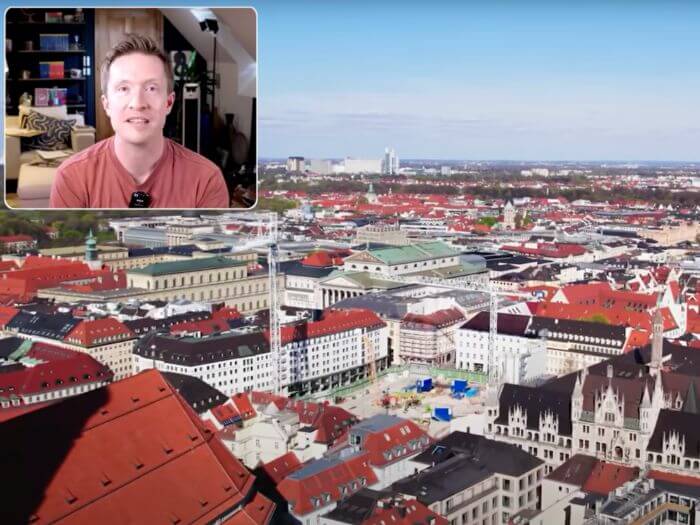
Here's what really got me thinking: what if I had learnt just “hello” and “thank you”? Just those two words might have completely changed how people saw me—not as someone who couldn't be bothered, but as someone who had at least made an effort.
Whether you're trying to order food without pointing at pictures, or you want to actually understand your favourite Netflix show without subtitles, or you just want to stop feeling like an idiot when you can't remember how to say “I'm running late”—we've all been there.
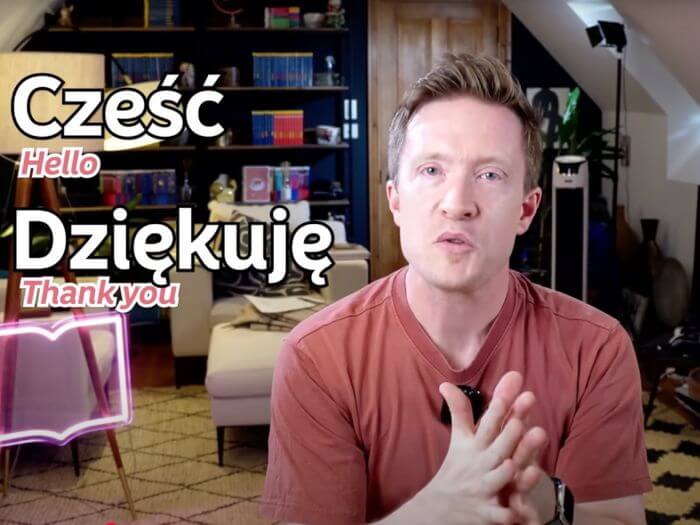
The problem isn't that we don't know words. The problem is that we're memorising words instead of learning how to actually use them when we need them.
All those hours spent drilling flashcards don't help you in the moment when you're actually trying to communicate unless something else also happens.
So let me show you what actually works.
Method 1: High-Quality Input – The Foundation Of Natural Learning
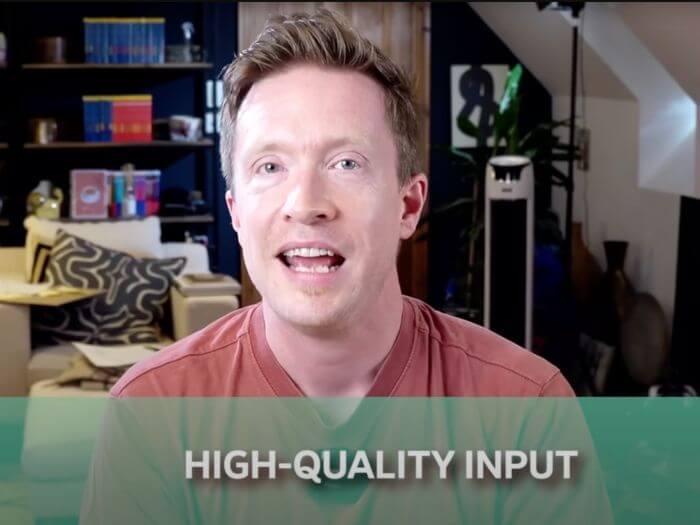
The first method for how to learn vocabulary without flashcards is all about high-quality input. What do I mean by high-quality input?
We don't actually need to obsess over which words we should learn. We don't need to choose the words we want to learn. You know that feeling when you're staring at a list of words thinking, “Okay, here are 100 words I need to memorise”? We can skip all of that torture.
Instead, we can spend time with input—listening to stuff, reading stuff, watching films. What happens then is just by following along with the plot or story, we create the conditions for our brains to pick up vocabulary naturally.
This isn't like memorising from a list, but rather exposing our brains to vocabulary so that over time, with lots of repetition, it has a chance to actually stick. What's more, these words are going to be easier to learn and better remembered because of context.
The 80% Rule For Effective Learning
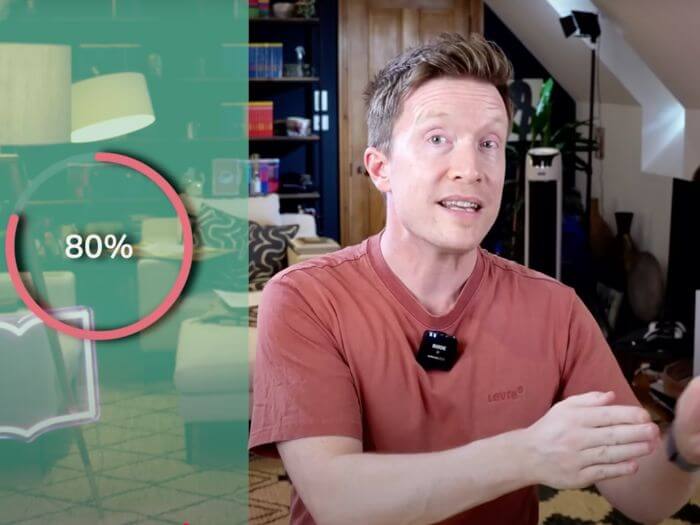
Here's the key, and I learnt this the hard way: you need to expose yourself to the right kind of input. The best type is where you understand at least 80% of what's going on—maybe even more, like 90-95%.
This is important. You want to choose material where you already understand most of what you see or hear.
Here's why: if you already understand nine out of every ten words, it's going to be very easy for you to guess that tenth word. That makes learning from context a lot easier.
Where people get into trouble is listening to stuff that's way too hard for them. Then every single word becomes a mystery because there's not enough context, not enough support to guess from.
That's why they can't learn from input and start to think, “Oh, reading is too hard. Listening is too hard.”
Finding The Right Material
Instead of turning on the first thing you can find on Netflix, spend a little time reviewing different material and find something that's at your level—something where you can already understand most of it.
Try this: spend a bit of time finding material that's in that comfortable zone, then try this reading or listening activity again and see how you get on. Look for content that challenges you just enough without overwhelming you completely.
Method 2: Active Conversation Practice
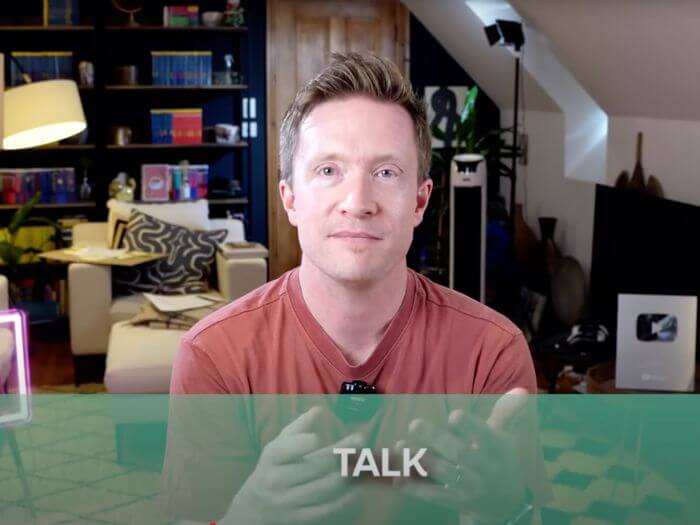
The next part about how to learn vocabulary without flashcards is to actually use it in conversation. Here's why this is so important:
A lot of people develop what's called passive vocabulary—words you can recognise when you hear them, but you can never actually recall them when you need to use them in conversation.
You know that feeling when you have a word on the tip of your tongue, but you just can't get it out.
The problem is, you can't be a fluent speaker if you can't instantly retrieve the words you need. It's like having a library full of unorganised books. They're there, but you have no way of knowing where anything is when you need it.
Breaking Out Of The Vocabulary Prison
The way to get words off the tip of your tongue and into actual conversation is to practise that recall—to practise being in conversation, digging up the word when you need it, and using it. It's like speeding up the pathways in your brain.
The more we talk with people, the more we have to recall vocabulary under pressure, and that's what eventually leads to fluency.
But here's what often happens: you end up falling back on the same safe words you always use, and it creates this vocabulary prison where you always describe everything with the same basic words.
Have you ever tried to explain something and ended up saying the equivalent of “it's like, you know, the thing that…”? That's the vocabulary prison right there.
Practical Application Strategy
Here's what I want you to try: be very aware of words you've made an effort to learn recently and then take them consciously into your next conversation.
You can try to remember them, or some people actually write them down and make an active effort to use these prepared words.
Once you've used a word successfully in conversation, it really gets implanted in your brain on a deeper level.
You want to know something embarrassing? I sometimes practise new words with my cat first. They don't judge, they don't correct my grammar, and honestly, it works better than most language apps.
Method 3: Learn What You're Interested In
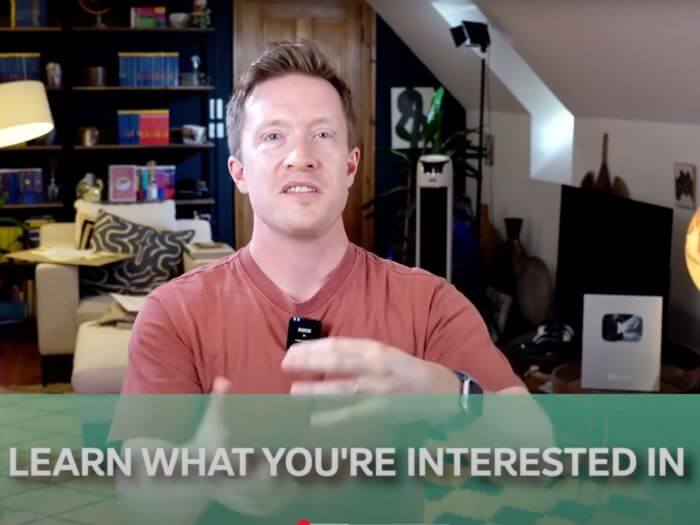
This next method creates a lovely virtuous circle, and it changed everything for me. When you're reading and listening to stuff you're interested in, you're naturally going to do more of it. It's funny how we always find time for the stuff we actually enjoy, isn't it?
Here's the key: if you're interested in something, you probably engage with that topic in multiple different ways. You read about it, you watch videos about it, you talk about it.
For example, I really enjoy travel. So whenever I'm learning a new language, I often learn words related to travel first.
This could be when I'm actually in the country and want to ask people for things—whether that's directions, recommendations for food, cultural events, and things like that—because I know I'm going to use it. It's also a great way and excuse to actually talk to people.
Personal Interest Trumps “Useful” Vocabulary
Whatever you're interested in—whether it's coding, trees, or sports—make an extra effort to learn vocabulary around those topics.
It becomes more useful because you're actually going to use it, and that creates this virtuous circle where you keep engaging with the language through things you care about.
I used to think I needed to learn so-called useful vocabulary first—the numbers from one to ten, the colours, those three phrases that show up in every textbook: “Where's the dormitory?” “Where are you from?” “I'm British.” Stuff that publishers decide are important.
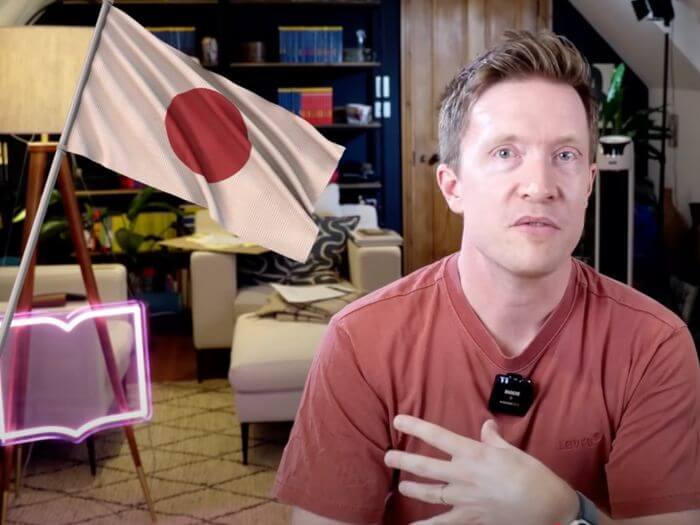
But then I decided to learn Japanese, and it was for my own reasons. I was fascinated by Japanese culture. I lived there. I was interested in the way they approach work and relationships and food.
So instead of learning textbook phrases, I dove into content about things that actually intrigued and excited me.
I read articles about Japanese business culture, watched cooking shows, listened to podcasts about people talking about daily life in Tokyo. Because I enjoyed it, I did more of it.
I kept going in that little vocabulary island, and suddenly my vocabulary grew really quickly. I made lots of connections, and now it's a huge part of my life—all because I followed my genuine interests instead of some random curriculum.
You know what I'm realising? There's this pattern in everything I'm sharing. We keep trying to memorise vocabulary like we're cramming for a test. What we actually need to do is develop a relationship with new words.
A strong vocabulary is like a great friendship—the words you spend time with stick around. The ones you just meet once at a party are gone.
Method 4: Review Through Vocabulary Islands
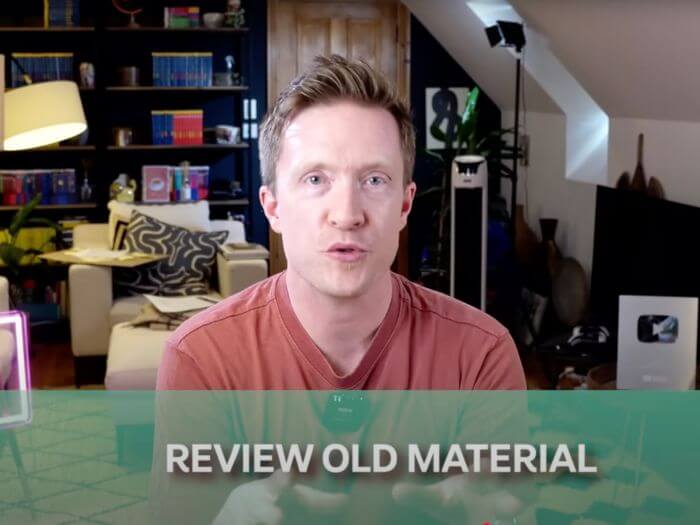
Here's something crucial about vocabulary: once you think you've learnt a new word, it's very dangerous to assume you'll know it forever because there's something called the forgetting curve—a curve that goes out into time where, guess what, we forget stuff.
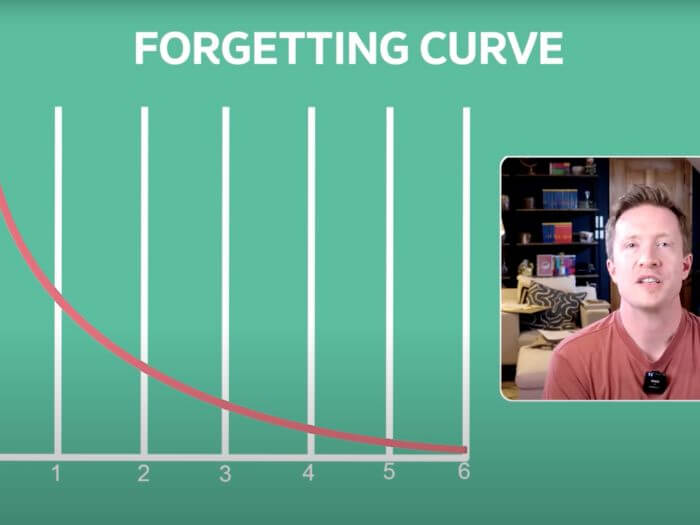
This is why I want to introduce you to something called vocabulary islands. This is a concept I first heard from my friend Richard.
Instead of learning random vocabulary from different topics each time, you intentionally spend time reading and listening to stuff around specific topics.
So you might spend a few weeks deliberately reading about food and drink—that's the vocabulary island.
When you do this intentionally, what happens is the same vocabulary crops up over and over again. That repetition makes you learn faster.
Here's the key: you need to go back to that material. You need to go back and read that article again, watch that TV show again. Whatever's been interesting and useful for you, you go back and revisit it.
That repetition leads to mastery. It could be that one extra hour spent with something you've already seen is the thing that solidifies it forever in your memory.
Real-World Example: Cantonese Through TV Drama

This is exactly what happened when I was learning Cantonese. I got completely hooked on this TV drama called “Triumph in the Skies.” There are two seasons, like a bazillion episodes in each one, but I watched the same episodes over and over.
Same characters, same conversations, same romantic drama that I was probably too invested in.
But something magical happened: the language started to stick naturally. The words they kept using, I knew them. Each time I went back, I caught more words, more phrases, more natural rhythm.
My brain did the same thing with language that it does when you rewatch your favourite shows and notice things you missed the first time.
Whether you use Netflix, library books, StoryLearning, language courses, or whatever, the principle is the same.
Stories happen to be really good at sneaking vocabulary practice past your brain's defences, but you can start doing this with anything you're already reading or watching.
Method 5: Focus On Phrases, Not Individual Words
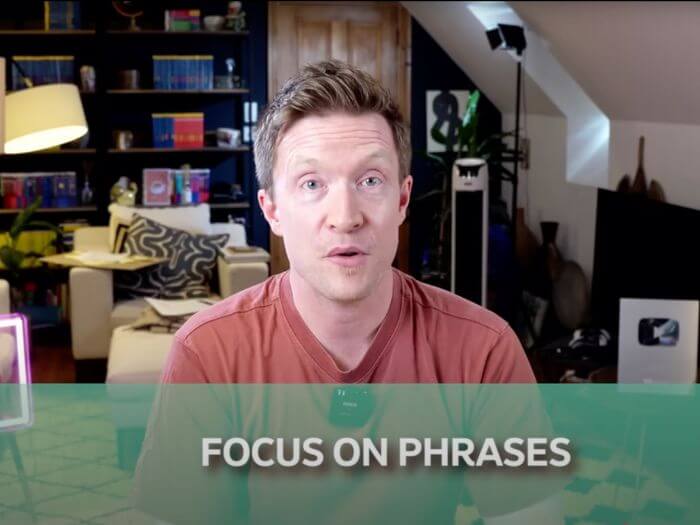
My next method for how to learn vocabulary without flashcards is to focus on phrases, not individual words. This is really enormous.
We often think of vocabulary as individual words, but actually, language is always used in chunks of words together.
Take the simple phrase “How are you?” It might sound like three words stuck together—and technically it is—but we always think of it as one single phrase.
None of us ask “How are you?” thinking, “Okay, what grammar goes with what?” We just say the phrase, right? Most of language works exactly like that.
Why Phrases Work Better Than Individual Words
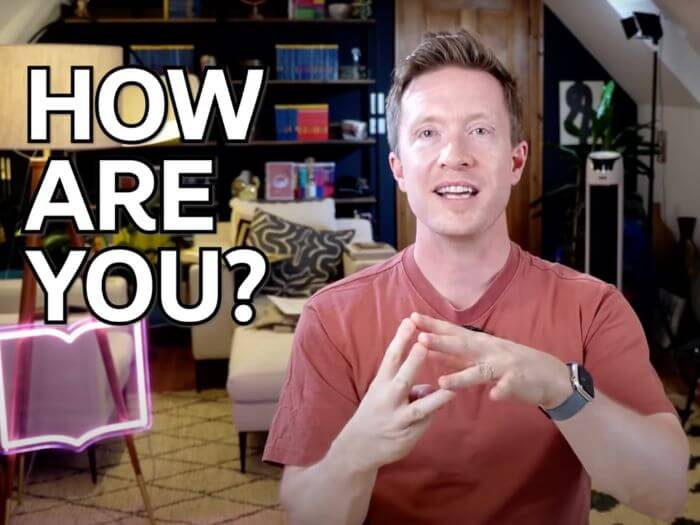
So instead of trying to learn words by themselves, put entire phrases into your notebooks or flashcards.
Here's why this works so much better: the more words you're learning at the same time in a phrase, the more anchor points you have to hold on to and remember. It actually becomes a memory aid to have more vocabulary in the same place, not less.
Whenever I'm learning a language and come across a word I want to remember, I always write down the full sentence that word comes in.
It doesn't take much more work because I already know most of the words in that sentence, but it's much more memorable because I have all these different anchor points for this new word to hold on to.
So if you're watching a film and hear a word you like, don't just write down that word—write down the whole phrase. It's the context that gives it meaning and makes it stick.
For the longest time, I was building sentences word by word like some kind of language robot, and it sounded exactly as natural as you'd expect.
But when you learn phrases, you sound like you actually know how the language works, not like you're translating from English in your head.
Bonus Method: Bedtime Vocabulary Review
If you'd like a sneaky bonus trick, here's one I discovered entirely by accident. A few years ago, I started reviewing new vocabulary right before I went to bed. This wasn't because I'm some super-disciplined person, but because I was procrastinating going to sleep.
It turns out your brain actually files away vocabulary for safekeeping whilst you sleep.
So just spend two minutes before bed looking at phrases you learnt that day—with no pressure, no stress, just like saying goodnight to your vocabulary friends—and you'll find that it stays in your memory a lot better than you might think.
With all that in mind though, here's a quick reality check.
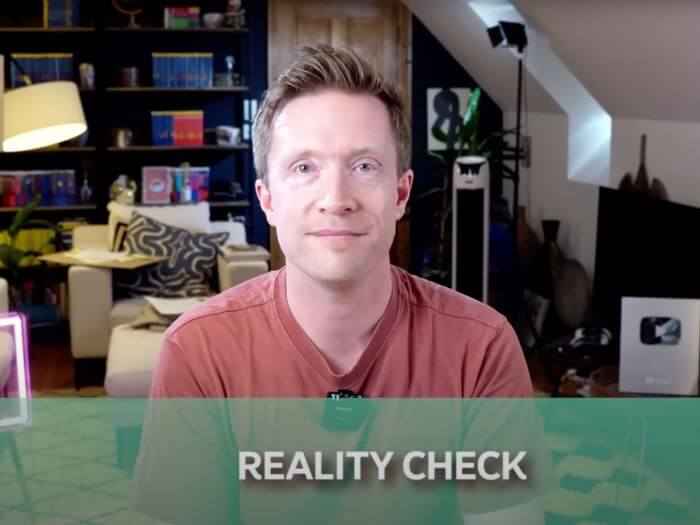
Some days you will forget words you were sure you knew. Some days you'll feel like giving up altogether. I still have those days all the time.
But instead of feeling like I was failing at some system, I started feeling like I was actually learning a language—building a real relationship with it instead of just cramming for a test.
This makes all the messy, imperfect, embarrassing moments worth it.
How To Learn Vocabulary Without Flashcards FAQ
How to memorise vocab without flashcards?
You can memorise vocabulary by reading, listening and using new words in real conversations or writing. Context-based learning makes words stick better than isolated memorisation.
How to learn 5000 words and more without flashcards?
Focus on extensive reading, watching shows and daily practice in the target language. Repeated exposure to words in natural contexts helps you remember thousands of words over time.
What is the easiest way to memorise vocabulary?
The easiest way is to connect words with images, stories or emotions. Using them in sentences and practising often makes them much easier to recall.
How to study without using flashcards?
Instead of flashcards, try keeping a vocabulary journal, practising conversations or using apps with interactive exercises. Engaging with real content like books, podcasts or films also boosts retention.
Your Action Plan: How To Learn Vocabulary Without Flashcards
So there you have it—five powerful methods for how to learn vocabulary without flashcards:
- Find high-quality input that challenges you just enough (80-90% comprehension)
- Talk actively about what interests you, practising recall under pressure
- Learn vocabulary around topics you're genuinely passionate about
- Review through vocabulary islands, revisiting the same content multiple times
- Focus on phrases and how words actually work together in real life
The goal is not to never forget words. It's to build a relationship with the language that's strong enough to handle forgetting and relearning and making mistakes.
The beauty of learning vocabulary without flashcards is that you're not just memorising isolated words—you're developing a natural feel for how the language works.
You're building connections, creating context, and most importantly, preparing yourself to actually use these words when it matters most: in real conversation.
Start with one method that resonates with you most. Maybe it's finding that perfect TV series to binge-watch, or perhaps it's finally exploring content about your biggest hobby in your target language.
Whatever it is, begin today, and watch as your vocabulary naturally expands in ways that actually help you communicate.

Olly Richards
Creator of the StoryLearning® Method
Olly Richards is a renowned polyglot and language learning expert with over 15 years of experience teaching millions through his innovative StoryLearning® method. He is the creator of StoryLearning, one of the world's largest language learning blogs with 500,000+ monthly readers.
Olly has authored 30+ language learning books and courses, including the bestselling "Short Stories" series published by Teach Yourself.
When not developing new teaching methods, Richards practices what he preaches—he speaks 8 languages fluently and continues learning new ones through his own methodology.









































